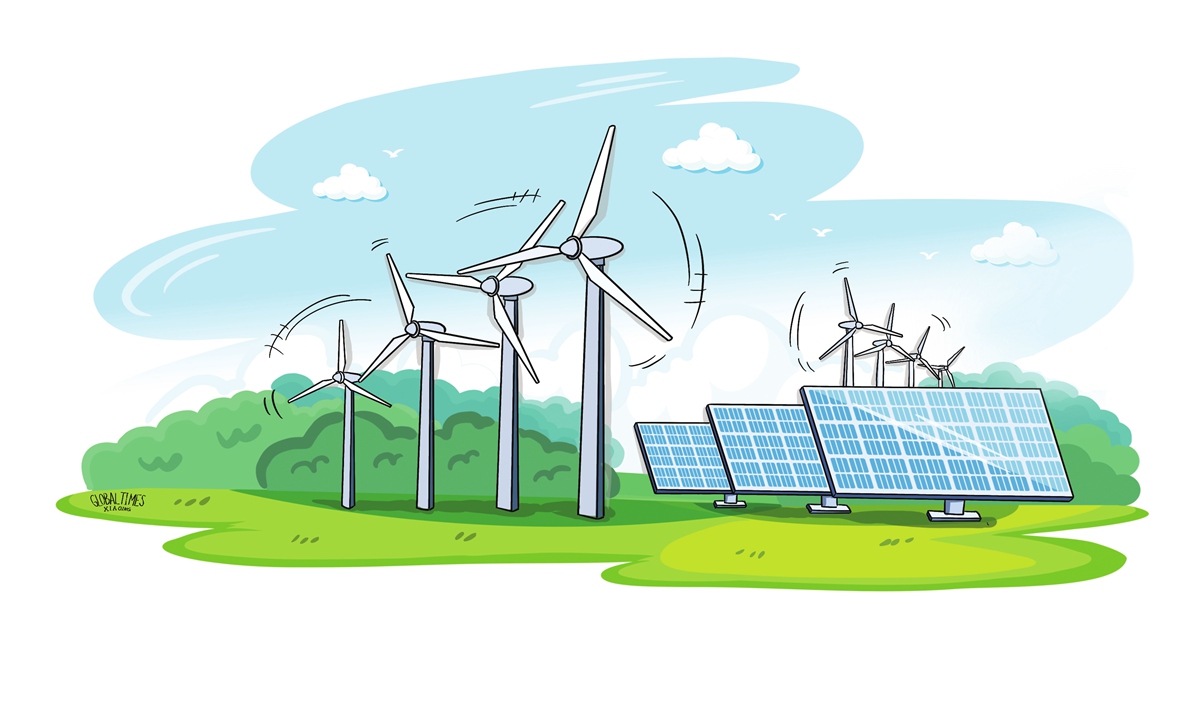
Illustration: Xia Qing/Global Times
Brussels is considering whether to launch an anti-subsidy investigation into China's exports of wind turbines, the Financial Times reported, citing an EU official. If the probe is implemented, it will be the second anti-subsidy investigation launched by the EU into Chinese new-energy products in the short term, after a probe into Chinese electric vehicles (EVs), which was announced on September 13.
The EU should understand that the rapid development of China's new-energy industries, including EVs, solar photovoltaic projects and wind turbines, are driven by a market that sees intense competition, which forces enterprises to continuously upgrade technology, reduce costs and improve competitiveness.
As of the end of June, China's installed wind power capacity was 389 million kilowatts, top globally for a 13th consecutive year, data from the nation's National Energy Administration showed. As reported by the Xinhua News Agency, the world's first 16-megawatt offshore wind turbine, located off the coast of East China's Fujian Province, has the largest single-unit generating capacity of any turbine in operation around the world.
What really worries European policymakers are not so-called "Chinese subsidies," but rather the technology, cost and competitive advantages of Chinese enterprises, which have posed unprecedented pressure and challenges to European companies.
As for Europe, in the face of fierce external competition, anti-subsidy investigations should not be allowed to become a "protective umbrella" for some European new-energy enterprises that lack innovation and technological breakthroughs. If European policymakers hope that Europe's new-energy sector can win amid fierce global competition, Europe needs free trade and market-oriented competition, not anti-subsidy investigations. Trade protectionism could only make things worse.
As a leader in global climate policy, the EU has long set ambitious goals to tackle climate change, but its pursuit of goals it set has been full of uncertainties and setbacks as the new-energy industries' development has not met expectations.
Even with the energy transition in full swing, Europe's solar and wind industries are facing their worst crisis ever, suffering record losses and issuing repeated profit warnings, Ann Mettler, former head of the European Political Strategy Centre, the in-house think tank of the European Commission, warned in August, saying that due to a mix of self-inflicted and external factors, wind "made in Europe" is simply too expensive, too slow and too weak.
Moreover, the energy crisis caused by the Russia-Ukraine conflict has added pressure to the EU's energy transition reform. In response, the EU is launching initiatives to strongly promote the development of the new-energy industry and help achieve energy strategic autonomy.
Last year, the EU launched the REPowerEU plan, but such plans still face challenges including funding, markets and supply chains. The European Commission estimates that achieving the REPowerEU goals will require an additional investment of 210 billion euros ($222 billion) by 2027. However, in the face of escalating inflation and sluggish economic growth, the source of this massive funding remains highly uncertain.
In this context, China and Europe need cooperation. Some European observers complain that the wind industry is already having to buy power cables, gearboxes and even steel towers from China, but it is undeniable that European companies have also advantages, especially in the fields of technology and high-end manufacturing. Although competition is fierce in the new-energy industry, it is believed that the economic complementarity serves as a key link in China-EU new-energy supply chains.
As reported, China's usage of renewable energy sources will surpass 50 percent in its overall energy usage increments by 2025, and the wind and solar energy sectors will be doubled from 2020, further accelerating the process of China achieving its stated carbon emissions goal. This means a huge potential market, not only for Chinese enterprises, but also for European and global companies.
EU's anti-subsidy investigation into Chinese EVs is a risky strategy that casts a shadow over the market, as well as bilateral cooperation. If Brussels is indeed considering implementing an anti-subsidy investigation against China's wind turbines, we sincerely hope that the EU will stop in a timely manner and not go further down the path of trade protectionism.
The author is a reporter with the Global Times. bizopinion@globaltimes.com.cn




